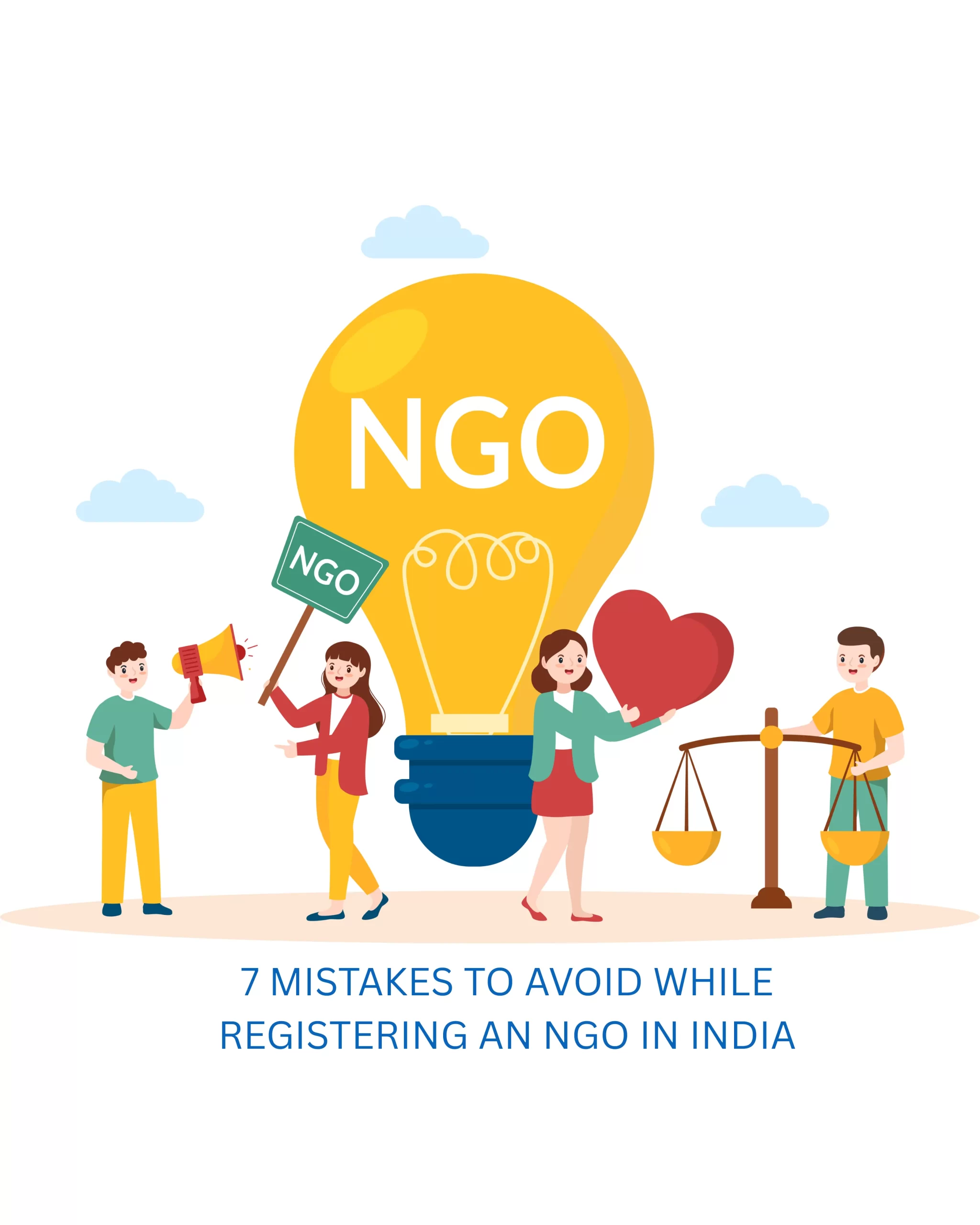Top 7 Mistakes to be Eliminated While Registering an NGO in India
Establishing an NGO is a wonderful way in which one can make a contribution to society. But to be legally operational and to earn public confidence, the first and most important step is right registration. Numerous would-be founders make small but costly mistakes at the time of registration.
Whether you are going to register a Trust, Society, or Section 8 Company, there are some common mistakes that can lead to rejection, postponement, or even future legal complications.
Let’s go step by step about the top 7 mistakes not to make when registering an NGO in India—along with smart tips to ensure it is hassle-free.
Mistake 1: Choosing the Wrong Legal Structure
The majority of individuals rush to register their NGO without knowing the distinction between Trust, Society, and Section 8 Company.
A Trust can be ideal for a small family-operated NGO with few activities.
A Society would be ideal for educational, social, or cultural organizations with state-level activities.
A Section 8 Company (MCA registered) would be ideal for professionals or large NGOs that require pan-India presence, transparency, and authenticity.
Why this is important:
Each model has different legal requirements, benefits, and compliance rules. Having the wrong one can affect your ability to get foreign contributions (FCRA), 80G exemptions, or open a bank account.
Pro Tip:
Always find a legal advisor who understands which structure suits your long-term plan.
Error 2: Incomplete Documentation
One of the most common errors is submitting incomplete or incorrect documents during registration.
For example:
MoA not signed in correct sequence
ID proofs not self-attested
Address proof of office not matching name
Lacking No Objection Certificate (NOC) of landlord
Why this matters:
Registration authorities are very finicky about documents. Omitting one page can result in rejection or holdup of months.
Smart Fix:
Create a checklist. Documents usually consist of:
Memorandum of Association (MoA)
Rules and regulations/bylaws
Address proof (rent agreement/utility bill)
Identity proof of all trustees/members
Photographs
NOC from landlord (in case of rented property)
PAN card after registration
Error 3: Failing to Check Name Availability
Your NGO name is its identity. But most applications get rejected simply because the name is already in use or is against government naming guidelines.
Example:
The MCA portal does not allow names that are too similar or close to those of other existing Section 8 Companies.
Similarly, Registrar of Societies or Charity Commissioner will not sanction names that are misleading, offensive, or similar to government bodies.
Smart Tip:
Make use of MCA name search facility for Section 8
Check with local Registrar of Societies
Avoid using names starting with “Government”, “India”, “Ministry”, or any political/religious association unless used for the purpose in mind
Mistake 4: Neglect of Digital Registration Process
These exist in today’s day and age—but not everybody is aware of it.
For example, if you are registering a Section 8 Company, you need to:
Get Digital Signature Certificate (DSC) for directors
Apply for Director Identification Number (DIN)
Submission of filing through the SPICe+ form on the MCA portal
If you are registering for NGO Darpan, the portal requests:
PAN
MoA
Founders’ Aadhaar-linked mobile numbers
Current contact details
Missing or omitting these steps will lead to rejection or time wastage.
Pro Tip:
Have a technology-enabled member or consultant assist in going through MCA’s or NGO Darpan’s online portals. Have your documents PDF-ready and digitally signed wherever required.
Mistake 5: Overlooking Tax Exemptions (12A & 80G)
The other glaring mistake is not availing 12A and 80G after registration.
12A provides relief from income tax to the NGO
80G allows donors to get relief from tax on donations
Without these, your NGO:
Can be taxed like a normal company
Will face it harder to convince donors, especially corporates
Pro Tip:
Submit File 12A & 80G under Income Tax Department through e-filing portal. Ensure you submit:
Correct audited financials (if required)
Activity details
Copy of MoA and registration certificate
Error 6: Not Maintaining Proper Records or Filing Returns
Registration isn’t the finish—it’s just the beginning of a long legal commitment.
Majority of NGO founders forget to:
Submit annual returns to Registrar of Societies
Maintain correct books of accounts
Submit FCRA returns if foreign contributions are received
Extend 80G, 12A, or other licenses as the case may be
Such negligence can:
Invite fines
Get your NGO blacklisted
Have your registration certificate revoked
Smart Tip:
Maintain a compliance calendar and hire a CA or law firm like Legal Dalal who can take care of regular documentation and return filing for your NGO.
Error 7: Filing Without Clear Objectives or Vision
Lastly, the most serious blunder is creating an NGO with no distinct reason or long-term vision.
Lots of registrations get rejected because:
The goals are unclear or pirated from different NGOs
The bylaws aren’t tailored for your mission
The MoA has too generic or irrelevant points
Why it matters:
The authorities desire clarity on what your NGO will do—education, women empowerment, climate change, etc.—and how it will do it.
Pro Tip:
Clearly articulate your mission and reflect it in your papers. Don’t copy-paste from the internet. Let your NGO have its own voice.
Final Thoughts
NGO registration in India isn’t just a legal requirement—it’s the first step towards building credibility, trust, and long-term impact.
By keeping away from these 7 mistakes, you will save yourself from months of back and forth, and more importantly, your cause from potential legal or financial issues in the future.
In search of a safe, affordable, and hassle-free registration process, give Legal Dalal a try. We possess a team of professionals that provides all sorts of NGO registrations in India—Trust, Society, and Section 8—and 12A, 80G, NGO Darpan, and FCRA too

